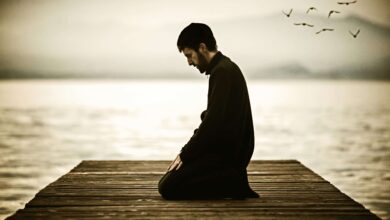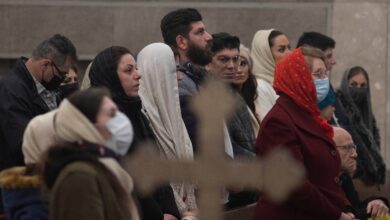J. D. Vance’s Radical Religion

In all the commentary about Donald Trump’s choice of Senator J. D. Vance as his running mate—he’s the survivor of a tumultuous upbringing in small-town Ohio, a former marine, a Yale Law graduate, the author of the 2016 memoir “Hillbilly Elegy” and the hero of the 2020 movie adaptation, a convert from Never Trumper to fervent acolyte—one aspect of his biography that could prove of major consequence has received scant attention: his religion. He became a Catholic in 2019, and since then he has aligned himself with conservative-Catholic currents of thought that have already had profound effects on the Supreme Court—and, through the Court’s overturning of Roe v. Wade, on American life broadly. Should Vance become the Vice-President, Justices Clarence Thomas, Samuel Alito, Brett Kavanaugh, and Amy Coney Barrett—all conservative Catholics—would have a Catholic ally of like mind in the executive branch. (President Biden’s Catholicism leans progressive, and is more devotional than doctrinal.) For now, Vance’s presence on the ticket represents the union of Trumpism and a movement that sees Catholicism as the embodiment of tradition, stability, and a top-down ordering of society, which would be enshrined through regime change. That’s a lot of symbolism to lay on a commitment of faith that a thirty-nine-year-old man made just five years ago, but Vance’s embrace of Catholicism is deeply bound up with his stated belief that religion has the power to shape the country.
Vance’s success with “Hillbilly Elegy” followed an intense period after his graduation from Yale Law, in 2013: working for the U.S. district-court judge David Bunning and for the giant Chicago-based law firm Sidley Austin; a stint in venture capital in Silicon Valley; marriage to Usha Chilukuri, a classmate who served as a clerk to Brett Kavanaugh, then a judge for the U.S. Court of Appeals in Washington, D.C. Vance has since characterized “Hillbilly Elegy” as the story of a “struggle to find stability” in his life; and in the book he presents religion as a force of stability which offsets the drugs, fractured families, serial romantic liaisons, and chronic unemployment that, in his view, had devastated his native Middletown, Ohio, and the rural Kentucky of his Scotch Irish ancestors. He observes that, though an “apocalyptic” outlook pervaded Middletown, “in the middle of the Bible Belt, active church attendance is actually quite low.” But he writes that “in the broken world I saw around me—and for the people struggling in that world—religion offered tangible assistance to keep the faithful on track.” His grandmother Mamaw called herself a “crazy bitch,” considered politicians “a bunch of crooks,” despised religious institutions and “loud and proud” devout Christians, and yet, in his recollection, possessed a confidence that “God never left our side.” He felt that she drew on this confidence as she raised him, while his mother, who was addicted to narcotics, cycled through relationships with feckless, angry men. His father, long divorced from his mother, found “a community of support” in a conservative Protestant church. Vance concluded that “religious folks are much happier” than others.
His conversion to Catholicism seems at once sincere and opportune. In an interview with Rod Dreher of The American Conservative, posted the weekend he was baptized, in August, 2019, Vance said, of Catholicism, “I’ve been reading and studying about it for three years, or even longer.” In 2016, he started a nonprofit intended to address the causes of opioid addiction and other social scourges. The next year, he joined a venture-capital outfit, led by the former AOL chief executive Steve Case, which focussed on identifying investment opportunities apart from the coasts. He was living in Columbus, Ohio, and travelling regularly to Washington, where Chilukuri Vance was a clerk to Chief Justice John Roberts. Around that time, he recalled in a 2020 essay, he had “a few informal conversations with a couple of Dominican friars”: one was Father Henry Stephan, at St. Gertrude’s Priory in Cincinnati, who had majored in politics at Princeton and served as an intern for Judge Diarmuid O’Scannlain—a founding member, in 1960, of William F. Buckley’s Young Americans for Freedom, the crucible of the postwar conservative movement. (Stephan declined to comment for this article.) Those conversations led to “a more serious period of study.” He and Chilukuri Vance, new parents, had bought a house in Cincinnati, where each worked remotely. (By then, she was a lawyer at Munger, Tolles & Olson, a firm based in California.) He was baptized and confirmed by Stephan at St. Gertrude’s.
The 2020 essay is a chronicle of Vance’s conversion; it appeared in The Lamp, a Catholic journal, under the headline “How I Joined the Resistance.” When he entered college, at Ohio State, Vance writes, he was an atheist who read Christopher Hitchens and Sam Harris. Two of the figures who changed his way of thinking, he explains, were St. Augustine, whose “City of God” he read at Ohio State, and the venture capitalist Peter Thiel, who gave a talk at Yale Law in 2011. Vance, in his essay, recounts being surprised by Thiel, whom he remembered denouncing the élite legal culture of which Vance was becoming a member, and, he writes, “arguing that we were increasingly tracked into cutthroat professional competitions. We would compete for appellate clerkships, and then Supreme Court clerkships. We would compete for jobs at elite law firms, and then for partnerships at those same places. At each juncture, he said, our jobs would offer longer work hours, social alienation from our peers, and work whose prestige would fail to make up for its meaninglessness.”
Thiel’s remarks, as Vance remembers them, were rooted in the thought of René Girard, a French-born polymath whose ideas Thiel had come across when he was a student at Stanford, where Girard was a professor. Girard, born in 1923, converted to Catholicism in 1959, and his texts are still best known among theologians and scholars of philosophical anthropology. One of his most influential ideas is that society is enslaved to a process of “mimetic desire” whereby people learn to want the things that others have, strive to have them for themselves, and then regard themselves as rivals when in fact they’re just imitating one another. Vance looked into Girard’s work, and over time, he writes in The Lamp, he came to see “mimetic rivalry” as an apt description for what goes on not only in places like Yale Law but in the meritocracy generally. The thrust of the essay is that becoming a Catholic was a means of defying the patterns of imitation fostered by the “meritocratic master class”—and, not coincidentally, what he saw as its way of inducing its members to believe that “Christians are rubes.”
Yet it could be said that in the years after law school Vance simply moved out of one élite and into another—and that he has thrived through mimetic rivalry. In Silicon Valley, he worked for Mithril, a venture-capital firm co-founded by Thiel. He wrote “Hillbilly Elegy,” appeared as a contributor on CNN, and wrote opinion pieces for the Times and The Atlantic. He ran for the U.S. Senate and won, bolstered by fifteen million dollars from Thiel. As a senator, he pivoted from harsh criticism of Trump to positions so closely akin to the former President’s that Steve Bannon suggested to Politico’s Ian Ward that Vance could be, as Ward put it, “St. Paul to Trump’s Jesus—the zealous convert who spreads the gospel of Trumpism further than Trump himself ever could.”
In the past few years, Vance has become a favorite of conservative Catholics. The Times’ Ross Douthat noted that he and Vance have been friends since “before he became a politician.” In 2021, Vance spoke at the Napa Institute’s “annual intellectual apostolic conference preparing Catholics for the Next America.” The next year, he gave a keynote address at a similar conference at Franciscan University, in Steubenville, Ohio, organized by the former New York Post and Wall Street Journal editor Sohrab Ahmari, himself a Catholic convert. One of the other participants was Adrian Vermeule, the Harvard Law professor (and a convert) who is a proponent of “integralism,” a scheme of governance that, as the Pepperdine University political scientist Jason Blakely observed in Commonweal, in 2020, “seeks to subordinate temporal power to spiritual power—or, more specifically, the modern state to the Catholic Church.”
In 2023, Vance took part in a discussion at the Catholic University of America with the Notre Dame political scientist Patrick Deneen, an advocate of “post-liberalism,” which, he explains in his books “Why Liberalism Failed” and “Regime Change,” is the view that liberalism has become an “invasive progressive tyranny” and so must be replaced by “a conservatism that conserves.” Vance greeted Deneen with a bear hug; during the discussion, Politico reported, Vance “identified himself as a member of the ‘postliberal right’ and said that he views his role in Congress as ‘explicitly anti-regime.’ ”
On the issue of abortion rights, Vance has been explicit—and inconsistent. As a Senate candidate, he called himself “100-percent pro-life,” opposing abortion even in cases of rape and incest, and supported a national abortion ban. Recently, Vance, in effect imitating Trump’s present views, has praised the Supreme Court’s ruling that the legality of abortion should be decided by the states. (“Alabama’s going to make a different decision from California. That is a reasonable thing. And that’s how I think we build some bridges and have some respect for one another,” he told Fox News on July 15th.) He has also spoken in support of the “abortion pill” mifepristone’s availability. (“The Supreme Court made a decision saying that the American people should have access to that medication,” he said on NBC’s “Meet the Press.” “Donald Trump has supported that opinion. I support that opinion.”)
Source link



